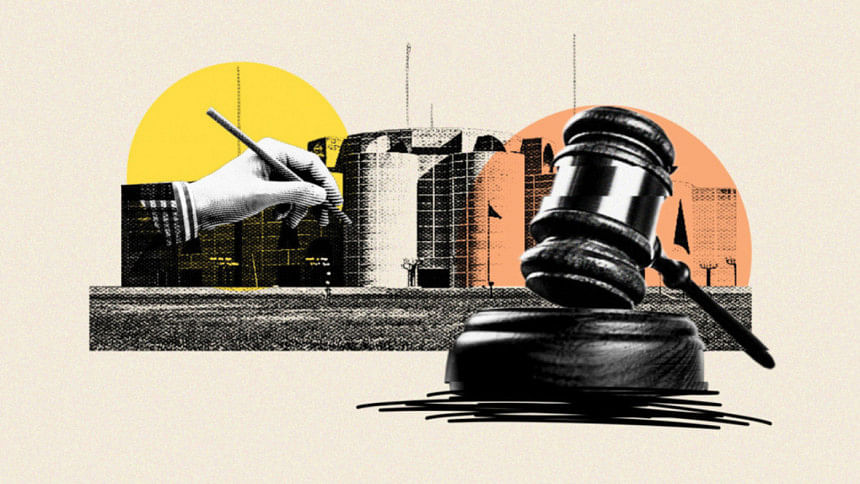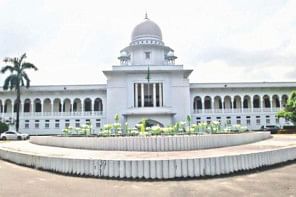Major parties favour bicameral parliament

At least 14 political parties, including BNP and Jamaat-e-Islami, are advocating for a bicameral legislature, instead of the current unicameral parliament, suggesting various models for the upper house.
However, they differ on the composition of parliament and the electoral process, as outlined in their proposals to the Constitution Reform Commission.
The parties propose changes to Article 70, which bars lawmakers from voting against party line, and also to the procedure for amending the constitution.
BICAMERAL LEGISLATION
The parties that want a bicameral legislature are BNP, Jamaat, Jatiya Nagorik Committee, Ganosamhati Andolon, Gono Odhikar Parishad (ex-Ducsu VP Nur faction), Bhashani Anusari Parishad, Jatiya Samajtantrik Dal (JSD), Revolutionary Workers Party of Bangladesh (RWPB), Nationalist Democratic Movement (NDM), Bangladesh Jashod, Jatiya Party (Kazi Zafar), Bangladesh Muslim League, Pragatashil Green Party and Khelafat Majlish.
BNP proposes a 50-member upper house called Senate, with its members elected through the same method applied to seats reserved for women. These seats will be allocated in proportion to the number of seats secured by a political party in the lower house.
Jamaat suggests an upper house with 151 seats that will include retired judges; bureaucrats; ex-military officials; and experts in peace and strategy, labour, foreign policy and other fields of study.
It also proposes a mixed electoral system, combining Bangladesh's prevailing system (first-past-the-post) with proportional representation, to avoid absolute and single-majority dominance and prevent a party from becoming authoritarian.
The Islamist party opposes the existing system of reserved seats for women but proposes keeping 20 seats for them in the upper house.
Ganosamhati Andolon proposes striking a balance of power between the lower and upper houses, and also provisions for impeaching the president and the PM, provided the motion secures a two-thirds majority in both chambers.
Jatiya Nagorik Committee, Gono Odhikar Parishad (Nur), and Khelafat Majlish propose a 100-member upper house, with a condition that 33 of the members should come from professionals, farmers, and labourers.
JSD wants a 200-member upper house, while Revolutionary Workers Party prefers a 150-member chamber. Both parties advocate for proportional representation in picking the members.
WHAT REFORM COMMISSION SAYS
The Constitution Reform Commission recommends a bicameral parliament, naming the lower house as National Assembly and the upper house as Senate.
The National Assembly will have 400 seats, including 100 reserved for women. The Senate will have 105 members, 100 of whom will be nominated by political parties in proportion to their representation in the lower house. The remaining five will include representatives from marginalised communities, as nominated by the president. These nominees will not be affiliated with any political party.
The tenure of both houses will be four years.
ARTICLE 70
A total of 16 parties seek changes to Article 70. They are BNP, Communist Party of Bangladesh (CPB), Khelafat Majlish, RWPB, Ganosamhati Andolon, Ganotantrik Bam Oikya, Nagorik Oikya, Jatiya Nagorik Committee, Islami Andolan Bangladesh, Rastro Sangskar Andolon, Bangladesher Samajtantrik Party (BSP), Bangladesher Samajtantrik Dal (Bashod), Bangladesh Labour Party, Bangladesh Jashod, Jatiyatabadi Samamona Jote and Jatiya Party (Kazi Zafar).
At least six parties propose repealing the Article. They are Bhashani Anusari Parishad, Bangladesh Revolutionary Communist League, Bangladesher Samajtantrik Dal (Marxist), NDM, Ganotantrik Biplabi Party, and Bangladesh Muslim League.
The Article stipulates that MPs have to resign if they vote against party line.
Jamaat is in favour of retaining the Article for two more terms, saying it was introduced to ensure government stability.
The party argues that the law (the Representation of the People Order, 1972) should be changed before political parties undergo reforms. Once the parties change from within, the chances of horse trading will decrease. Thereafter, any amendment to Article 70 may be considered.
BNP proposes changing the existing provision to allow MPs to vote against party line, with the exceptions of no-confidence motions, finance bills, constitutional amendments, and matters of national security.
Bashod suggests that MPs be allowed to vote against party line in cases of no-confidence motions, finance bills and issues of national security such as an attack by a foreign enemy or war.
CPB, Jatiya Nagorik Committee, Islami Andolan Bangladesh, and Khelafat Majlish propose allowing MPs to vote against party line except for no-confidence motions.
Jatiyatabadi Samamona Jote says parliamentarians should be given the opportunity to vote against their parties only on the issue of agreements with foreign countries.
WHAT REFROM COMMISSION SAYS
The commission recommends modifications to Article 70, allowing MPs to vote against party line with the exception of finance bills.
AMENDMENT TO THE CONSTITUTION
BNP suggests scrapping the changes introduced by the 15th amendment, which states that the constitution can be amended with a two-thirds majority in parliament.
Prior to the 15th amendment, the constitution stipulated that a bill, seeking to amend the preamble or provisions under articles 8, 48, 56, or the amendment provisions, be passed in parliament and presented to the president for approval. Thereafter, the president must call a referendum within seven days. This will allow people to decide whether the bill should be approved or not.
The only time a constitutional referendum was held in Bangladesh was on September 15, 1991, for amending articles 48, 56 and 142. That referendum asked voters whether the president "should or should not" assent to the 12th amendment that led to the reintroduction of parliamentary system, with the president becoming the head of state, and the PM the head of the executive. It also abolished the post of vice president and enabled parliament to elect the president.
Jamaat proposes that constitutional amendments should require a three-fourths majority in the upper chamber. If that fails, the matter could be resolved through a referendum.
Ganotantrik Biplobi Party says the constitution should be amended through referendums. AB Party and Rastro Sangskar Andolon suggest that a two-thirds majority in the House, followed by a referendum, should be needed for amending the constitution.
Khelafat Majlish says constitutional amendment regarding the state's ideology, basic principles and fundamental rights should be carried out through referendums.
Bangladesh Muslim League proposes that constitutional amendments should require a four-fifths majority vote from lawmakers in both lower and upper chambers, subject to the approval of 60 percent of voters through a referendum.
Furthermore, BNP, Jamaat, Khelafat Majlish, Rastro Sangskar Andolon, Insaniyat Biplab Bangladesh, RWPB, and Jatiya Nagorik Committee call for revoking Article 7B. The Article renders unamendable certain key provisions of the constitution, including Article 142, the preamble, and all articles in Part I and Part II, along with provisions related to the basic structure of the constitution.
WHAT REFORM COMMISSION SAYS
The constitution reform commission recommends repealing article 7B.
It says any amendment to the constitution should require a two-thirds majority in both chambers. Once passed by both chambers, it will be put out for a referendum where a simple majority will be deemed as approval of people.

 For all latest news, follow The Daily Star's Google News channel.
For all latest news, follow The Daily Star's Google News channel. 



Comments